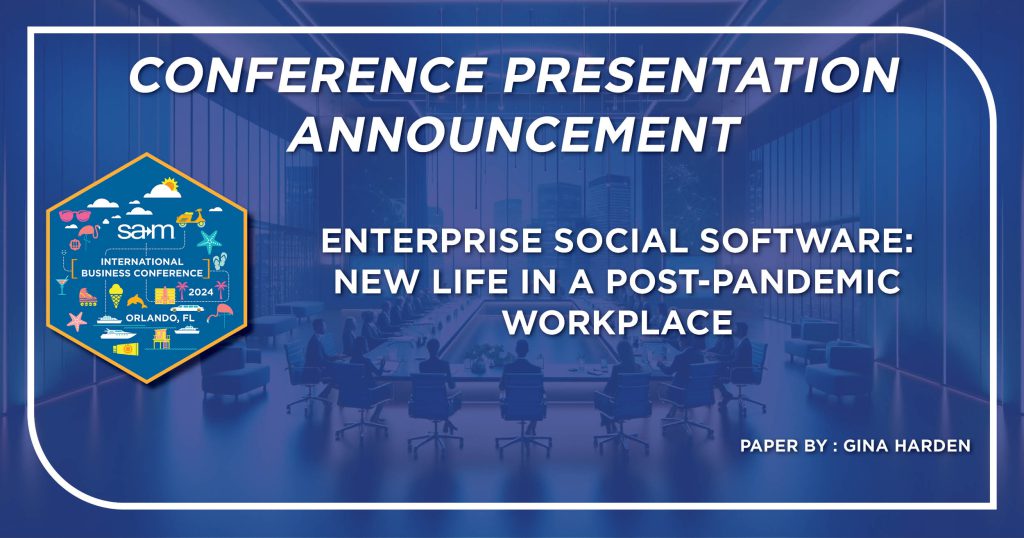
The programming committee for the 79th Annual SAM International Business Conference is pleased to announce the acceptance of the presentation, Enterprise Social Software: New Life in a Post-Pandemic Workplace by Gina Harden.
In the ever-evolving landscape of modern business, the ability to foster effective communication and knowledge sharing within an organization has never been more crucial. As companies strive towards achieving organizational success, the significance of open lines of communication among all stakeholders becomes increasingly apparent. Managers who succeed in creating environments where information flows freely often enjoy higher levels of trust and engagement from their employees. It is in this context that the recent academic paper by Al-Alawi et al. (2007) and subsequent findings by Pirkkalainen & Pawlowski (2014) gain particular relevance, shedding light on the pivotal role of enterprise social software (ESS) in bridging communication gaps within large, geographically dispersed organizations.
The paper, which is set to be presented at the upcoming SAM International Business Conference, explores the nuanced dynamics of ESS in fostering digital communication among employees, particularly in the face of challenges posed by the global pandemic. Before the world was thrust into remote working, ESS offered a promising avenue for enhancing digital connectivity, enabling employees to strengthen ties and form new relationships through a common, public platform conducive to social interaction and knowledge sharing. This potential was, however, met with resistance from some managers who viewed time spent on these platforms as counterproductive, and from employees wary of sharing knowledge that might compromise their competitive edge within the organization.
The advent of the pandemic brought these issues into sharper focus, as traditional methods of in-person communication were supplanted by virtual meetings that often lacked the spontaneity and full engagement of face-to-face interactions. This shift highlighted the critical need for platforms like ESS to facilitate effective communication among remote and geographically dispersed workers, providing a space for spontaneous interaction that pre-planned virtual meetings could not replicate.
Drawing on interviews with IT professionals, the paper presents insightful findings on the challenges and opportunities associated with implementing and promoting the use of ESS within organizations. It convincingly argues that ESS can serve as a vital link in ensuring remote employees feel engaged, connected, and able to interact freely, thereby overcoming some of the inherent limitations of virtual meetings popularized during the pandemic.
As we stand at the cusp of a new era of hybrid work models, with employees gradually returning to the office either part-time or full-time, the relevance of ESS continues to grow. The paper not only contributes valuable insights to the academic literature on knowledge sharing and communication technologies but also offers practical guidance for managers seeking to navigate the complexities of virtual communication in a post-pandemic world. The presentation of this paper at the SAM International Business Conference promises to spark meaningful discussions on the future of workplace communication, highlighting the indispensable role of technology in keeping our global workforce connected and engaged.
Join us online or in person at SAMIBC 2024 and see this great presentation and many more March 19 – March 23, 2024. For registration information visit www.samnational.org/conference.
